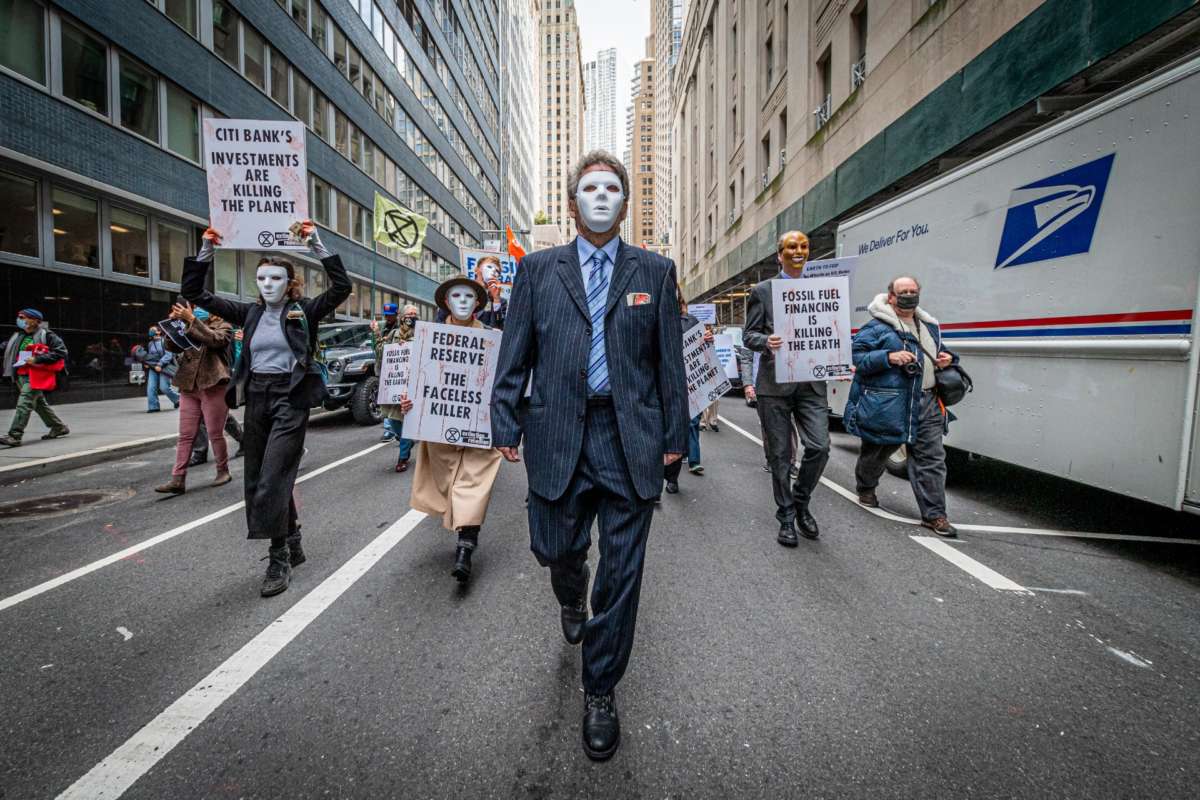Truthout is an indispensable resource for activists, movement leaders and workers everywhere. Please make this work possible with a quick donation.
Flouting their public vows to put themselves and their clients on a path to net-zero greenhouse gas emissions, the world’s 60 largest private banks have provided a total of $4.6 trillion in financing for the fossil fuel industry since the Paris Agreement entered into force in 2016.
That’s according to the latest edition of Banking on Climate Chaos, an annual report that tracks the banking industry’s funding of oil and gas initiatives that are threatening global hopes of reining in carbon pollution and averting climate disaster.
Authored by Oil Change International, the Rainforest Action Network, the Indigenous Environmental Network, and other groups and endorsed by hundreds of organizations from around the world, the report published Wednesday spotlights the marked contrast between banks’ public commitments to net-zero emissions targets and their actions, which reflect a continued stake in fossil fuel development.
In 2021 alone, the report finds, the world’s biggest private-sector banks financed oil and gas to the tune of $742 billion. That year, the 60 banks featured in the new analysis poured $185.5 billion into the 100 companies doing the most to expand the fossil-fuel sector worldwide through offshore drilling, fracking, coal mining, liquefied natural gas infrastructure, and more.
The worst offenders in the banking industry, according to the report, are the U.S. financial behemoths JPMorgan Chase, Citi, Wells Fargo, and Bank of America, which together accounted for 25% of all fossil fuel financing identified over the past six years.
The report highlights a number of specific projects, including the Mountain Valley Pipeline (funded by JPMorgan Chase, Wells Fargo, and Bank of America), drilling in offshore Guyana (funded by JPMorgan Chase, Citi, and Bank of America), and the Line 3 Pipeline (funded by TD, Scotiabank, and the Bank of Montreal), efforts that have drawn fierce resistance from Indigenous communities.
“Indigenous peoples have long been leading the fight for the sacredness of the land, water, and Earth,” Mea Johnson, divestment campaign coordinator with the Indigenous Environmental Network, said in a statement Wednesday. “Mother Earth has always given us what we need to thrive. We will not back down until our natural balance is restored and anyone helping fund the extractive destruction of our communities will be held accountable.”
Alison Kirsch, research and policy manager at the Rainforest Action Network, added that “any further expansion of fossil fuels risks locking humanity into generations of climate catastrophe, yet the top fossil clients of the world’s largest banks are still being showered with tens of billions of dollars even as they actively expand drilling, mining, fracking, and other fossil fuel development unabated.”
“With Wall Street banks leading the charge,” Kirsch added, “these financial institutions are directly complicit in undermining a climate-stable future for us all and must immediately end their support of any further fossil fuel infrastructure expansion.”
The banks’ financing decisions fly in the face of their own pledges to bring their policies into line with critical climate goals, such as achieving net-zero greenhouse gas emissions by 2050, a benchmark that 44 of the 60 banks profiled in the new report have backed.
According to the International Energy Agency, reaching net-zero emissions by 2050 would mean ensuring “no new oil and gas fields.”
“But global banks have massively supported the companies doing the most to open new oil and gas fields,” notes the new report. “Banks with net-zero commitments last year… financed the top 20 upstream oil and gas expansion companies, potentially helping to lock the planet into decades of climate-warming emissions.”
Adele Shraiman, a representative for the Sierra Club’s Fossil-Free Finance campaign, said Wednesday that the analysis “makes it clear that banks must clean up their act and stop funding the expansion of dirty fossil fuel projects like fracked gas exports, tar sands pipelines, and offshore drilling in order to align with what the science demands and what their own commitments require.”
“Despite their splashy climate pledges, big banks have largely continued with business-as-usual and actually increased their overall fossil fuel financing since the Paris Agreement,” said Shraiman. “As we look ahead to shareholder season, we’ll be keeping up the pressure on the banks and their investors to take these critical reforms seriously and stop bankrolling the fossil fuel industry’s reckless expansion plans.”
A terrifying moment. We appeal for your support.
In the last weeks, we have witnessed an authoritarian assault on communities in Minnesota and across the nation.
The need for truthful, grassroots reporting is urgent at this cataclysmic historical moment. Yet, Trump-aligned billionaires and other allies have taken over many legacy media outlets — the culmination of a decades-long campaign to place control of the narrative into the hands of the political right.
We refuse to let Trump’s blatant propaganda machine go unchecked. Untethered to corporate ownership or advertisers, Truthout remains fearless in our reporting and our determination to use journalism as a tool for justice.
But we need your help just to fund our basic expenses. Over 80 percent of Truthout’s funding comes from small individual donations from our community of readers, and over a third of our total budget is supported by recurring monthly donors.
Truthout’s fundraiser ended last night, and we fell just short of our goal. But your support still matters immensely. Whether you can make a small monthly donation or a larger one-time gift, Truthout only works with your help.
